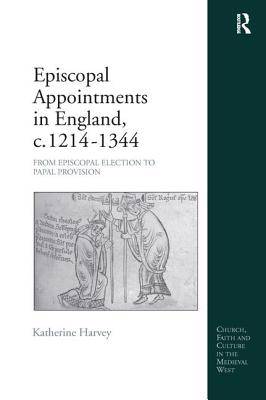
- Afhalen na 1 uur in een winkel met voorraad
- Gratis thuislevering in België vanaf € 30
- Ruim aanbod met 7 miljoen producten
- Afhalen na 1 uur in een winkel met voorraad
- Gratis thuislevering in België vanaf € 30
- Ruim aanbod met 7 miljoen producten
Zoeken
Episcopal Appointments in England, c. 1214-1344
From Episcopal Election to Papal Provision
Katherine Harvey
€ 112,95
+ 225 punten
Uitvoering
Omschrijving
Bishops were central figures in medieval society and the circumstances of their appointments are of great historical importance. This book considers the theory and practice of free canonical election in its heyday under Henry III and Edward I, and the nature of and reasons for the subsequent transition to papal provision. An analysis of the theoretical evidence for this subject (including canon law, royal pronouncements and Lawrence of Somercote's remarkable 1254 tract on episcopal elections) is combined with a consideration of the means by which bishops were created during the reigns of Henry III and the three Edwards.
Specificaties
Betrokkenen
- Auteur(s):
- Uitgeverij:
Inhoud
- Aantal bladzijden:
- 352
- Taal:
- Engels
- Reeks:
Eigenschappen
- Productcode (EAN):
- 9781138250093
- Verschijningsdatum:
- 9/09/2016
- Uitvoering:
- Paperback
- Formaat:
- Trade paperback (VS)
- Afmetingen:
- 156 mm x 234 mm
- Gewicht:
- 494 g

Alleen bij Standaard Boekhandel
+ 225 punten op je klantenkaart van Standaard Boekhandel
Beoordelingen
We publiceren alleen reviews die voldoen aan de voorwaarden voor reviews. Bekijk onze voorwaarden voor reviews.







